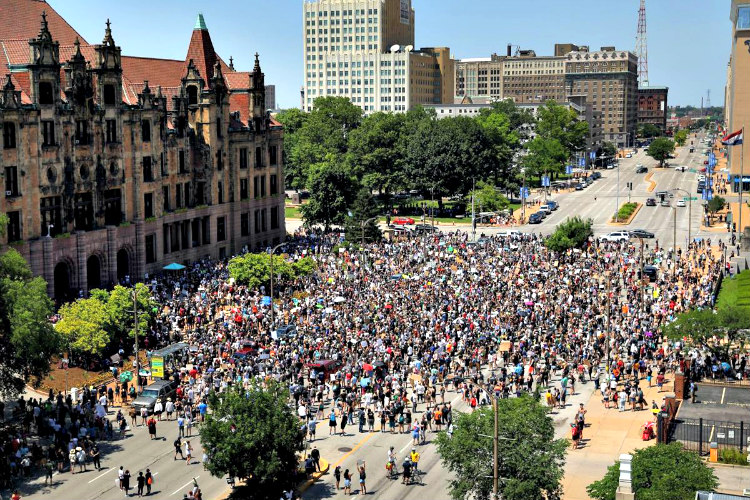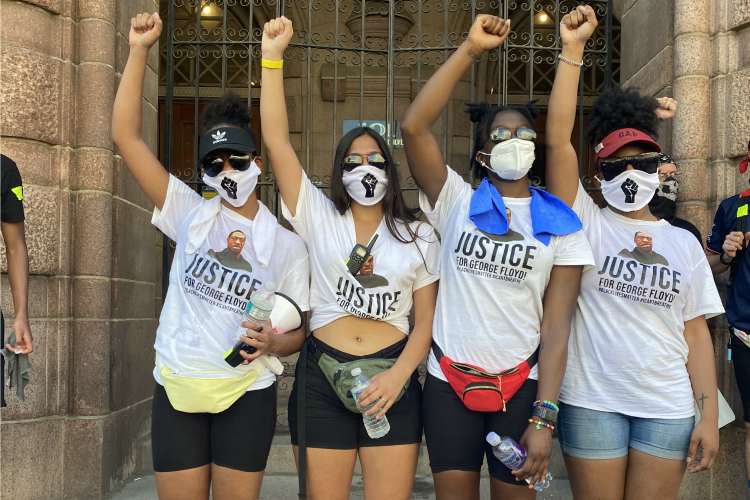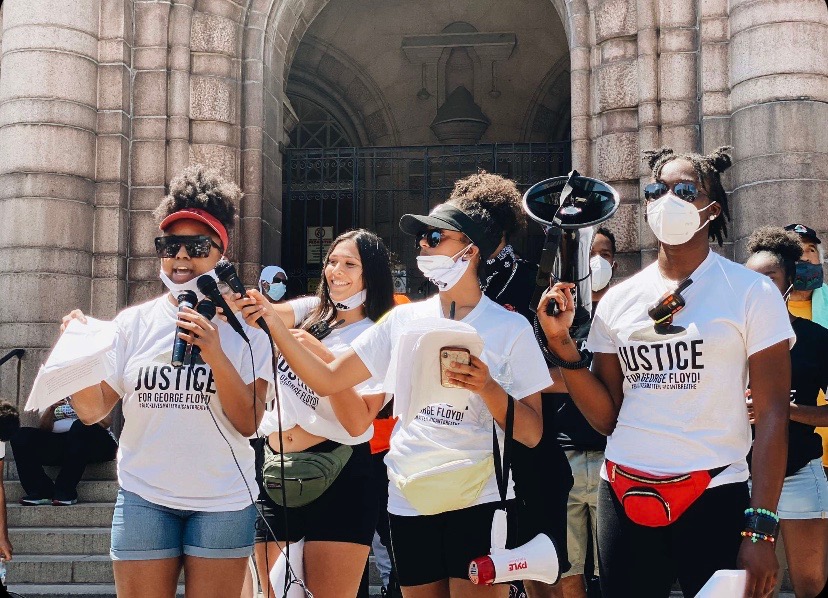School of Education senior Daishanae Crittenden has a clear idea of how she wants to structure her future classroom – as a team. Her passion for teaching and her want to help shape the lives of her students fuels her activism in the community. Though she’s only had practicum teaching experience so far, she’s already hard at work showing her future students that she’s advocating for them not just through their academics, but also through social justice. This is her story.
Why did you choose to attend UMKC?
I knew I wanted to get out of St. Louis, but I didn’t want to go too far because I wanted to be able to come back and visit my mom. My mom is like my best friend. She’s one of my biggest supporters. Kansas City is similar to St. Louis – just a little smaller; and UMKC isn’t small but it isn’t too large either. Plus, in the School of Education, the classes are smaller. I was able to get out and work in the field and get practicum teaching experience earlier than I would at a larger school.
"I want my future students to see that I did this, that I’m fighting for them. We have to fight for things to be better for future generations."
What drives your passion for wanting to be a teacher?
Growing up all my teachers told me I would become a teacher. My mom was a teacher for many years. She instilled the value of education in me. I’m also the oldest of five; I have four younger brothers, so teaching kind of came naturally. I denied it for a long time but eventually, I accepted it. I love kids. I don’t care what grade I teach; I just know that I want to teach children and be a part of shaping their lives.
What other student activities are you involved in at UMKC?
Being in education doesn’t give you a lot of free time because I’m doing practicum work in the schools. I was part of the student government at the School of Education, and then I also participate in NAACP and The African American Student Union when I do have time.
"Our protest was about unity. It was about all of us being on the same team; we are fighting for the same cause."
Speaking of which, tell me about the large protest you were a part of organizing in St. Louis.
That was so exciting. I still can’t believe I did that.
It was me and three friends I went to school with. It was right after the murder of George Floyd. I remember waking up one day to a bunch of texts in our group chat and we were all talking about how we need to do something. We couldn’t just sit by and do nothing, and there hadn’t been anything organized by women in our city and we need to hear women’s voices too. So we came up with the idea to have a protest. I was kind of nervous about it because I’ve never organized a protest before.
Wow! I wouldn’t have guessed that. From the media coverage and feedback, it seemed really organized. How long did it take you to organize?
We pulled it off in like 8 days, so there were a lot of long nights. We made the flyer and posted it and, with all of our connections, people started sharing it on Facebook.
We had eight speakers, including an educator, a Pride representative, a speaker from the first Black Lives Matter movement in Ferguson, Cori Bush, who was a campaign surrogate for Senator Bernie Sanders, and a local pastor. We had a lot of people who wanted to speak but those are the ones we chose.

How did you narrow down your choices for speakers?
Each of the speakers were vetted. We shared a Google Form for potential speakers to complete and let us know what they wanted to talk about, and then we did Zoom interviews with the people we were interested in hearing from. We also sent follow-up letters to let everyone know whether or not they were selected. During the protest, we strategically placed our speakers in a certain order. The first group of speakers spoke prior to the march at City Hall to inspire and motivate the protestors, and the second group of speakers spoke at the downtown St. Louis Police Department to further discuss the deeper systemic issues within our country and why we are fighting this fight.
Some people already had scripts written and submitted them with the Google Form, but we asked for final copies of everyone’s script closer to the event because you just never know what someone will get on the mic and say. We didn’t want any surprises, and we didn’t want anyone to say anything that might incite violence.
The attention to detail is impressive. How were you able to ensure it remained peaceful the entire time?
We really made sure everyone knew that it was going to be peaceful. We couldn’t say that enough. We included that in everything we put out. And people who know me know that I don’t like violence or drama. It’s all about how you present yourself to the public, so people know that’s not what I’m about. More importantly – and I know not everyone is religious – but I have faith in my God and He had us.
We marched from downtown City Hall to the police headquarters without any problems. We didn’t want to agitate the officers and meet anger with anger, but we did make sure we had someone there to read everyone their rights before we started walking. People also donated bail funds in case we had to get anyone out of jail.
Our protest was about unity. It was about all of us being on the same team; we are fighting for the same cause.
"Growing up all my teachers told me I would become a teacher. My mom was a teacher for many years. She instilled the value of education in me."
Circling back to teaching, how do you apply the lessons you’ve learned at the School of Education to your activism?
In education, you learn to work with people from different backgrounds but with similar interests and outlooks. We did that with the protest, and I want my classroom to be structured like that. I want my students and me to work together and win together, and I never want them to feel like they can’t come and talk to me. I want my future students to see that I did this, that I’m fighting for them. We have to fight for things to be better for future generations.

Lastly, what has this experience taught you?
I learned that I am capable of leading a crowd. Nearly 5,000 people showed up and we led them. I also learned that it’s OK to be flexible and wing things. You can’t micromanage a protest, just like you can’t micromanage a classroom. You have to just take things one step at a time.
Half the people that showed up were allies, which goes to show that skin color is an excuse. So is age. We had babies walking with us! This protest was all-inclusive. We tried to make sure everyone was represented and felt that Black lives matter, Black trans lives matter…Black people matter. We had an ASL interpreter signing everything, as well, to make sure the deaf community knew what we were saying. It was an amazing experience; I still can’t believe I did that.
People have been asking when we’re going to plan another one and we keep saying we need a minute to breathe. This took a lot out of us. It’ll have to be in the next month or so, though, because we all attend different universities across the country, and we’ll have to go back to school soon.
Of course, I’m at UMKC, one of the girls goes to Xavier University, which is an HBCU in Louisiana; one attends the University of Miami and one attends the University of California-Irvine. Had it not been for COVID, we wouldn’t have been able to pull this off. We just all happened to be home because the universities closed.

